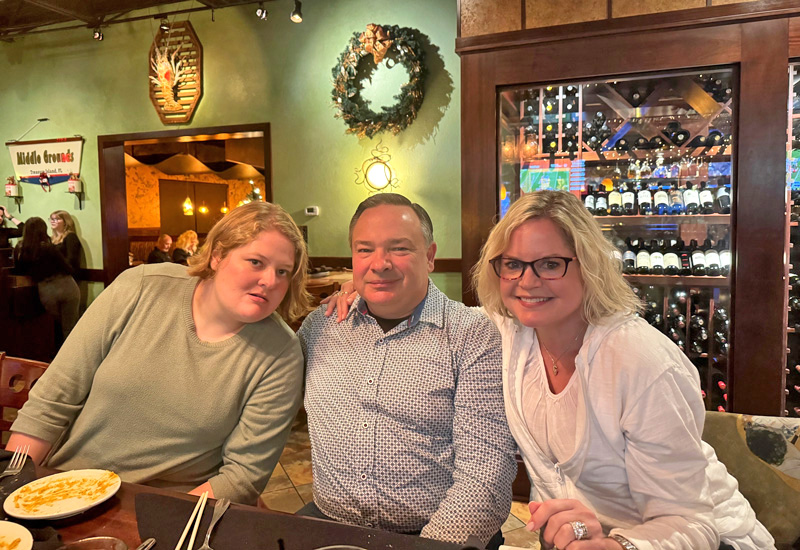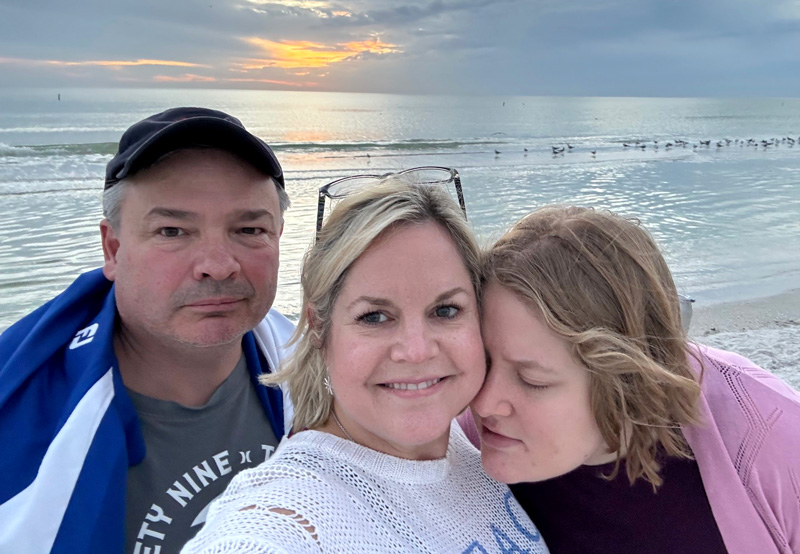When my husband, Matt, and I set out on a quick trip to Florida with my 21-year-old daughter, Annie, who has autism and intellectual and developmental disabilities, among other differences, I had no idea how simple acts of kindness in the days to come would leave a lasting impact.

Devereux National Director of Family Engagement Amy Kelly (right) with her husband, Matt (middle), and daughter, Annie (left), during a recent trip to Florida.
We had flown with Annie twice before and were confident our latest journey would go smoothly. Tip: When I book airline tickets, I always let the airlines know about Annie’s disability during the ticket registration process. This allows us to board before everyone else, with airline staff available to assist if needed.
When we arrived at our hotel, I could tell Annie was anxious. The pool and the beach helped, but Annie was clearly not in “vacation mode.” We took her into town, bought her bright blue Cookie Monster ice cream, and walked around. She had fun, but something was still wrong. Then, I realized the issue. To self-regulate, Annie typically has access to various sensory items, such as a rice bin, a bowl with dried beans, and magazines with perfume samples.
Act of Kindness #1: A Generous Gesture
If you have a loved one with autism, you have likely experienced the stress that can occur when they are missing their sensory comforts. We went to a grocery store to pick up dried rice, lentils, and a beach bucket to make a sensory bowl. You could see the excitement on Annie’s face when we found the items. I was worn down when we went to check out, and Annie was anxious to put her bowl together. When I pulled out my wallet to pay, the cashier said, “Ma’am, the couple behind you is paying for your order today. There is no charge.”
I was stunned. No one had ever done that for us before. I looked at the couple and said, “How lovely of you! Thank you so much! I’m guessing you understand something about autism?” They did not say a word. The gentleman simply gave me a wink and a smile.

The family enjoying a sunset on the beach.
Act of Kindness #2: A Surprise Gift
That evening, we went to dinner at a local restaurant. While Annie was happy to be out, she looked forward to dessert. She wanted an ice cream sundae on top of a cookie, a treat not on the menu. The bartender overheard us and said, “I have these amazing cookies. There’s one left that I would love to give Annie to eat with her ice cream if that’s OK.” Annie was so delighted – she ate her dessert before dinner.
Act of Kindness #3: Lending a Helping Hand
The next day, we flew home. When we landed at the airport, my husband took the shuttle to get our car, and Annie and I were in charge of the luggage. Annie was not thrilled about waiting for our bags and was near the brink of a tantrum. As I calmly tried to explain that we were almost done, I saw one of our bags on the baggage carousel. A man beside me whispered, “I would be happy to get your bags for you. My brother has a disability, and I’ve seen my parents go through what you are going through right now. May I help you?”
What a relief! His simple act of kindness helped me feel less anxious and saved me from trying to manage Annie’s frustration with getting our three big bags off the belt.
While our trip may have been short, it was filled with important lessons about the power of paying it forward through small acts of kindness. Even in challenging or stressful times, the compassion and generosity of strangers showed me that we are never alone and reminded me that by doing something kind for someone who is least expecting it, you might end up feeling better yourself, knowing you made their day a little easier.
About Amy Kelly
Amy Kelly, MBA, MNM, is the mother to Danny, Annie and Ryan. Annie is diagnosed with moderate to severe autism, verbal apraxia, intellectual and developmental disabilities, and general anxiety disorder. Amy is the National Director of Family Engagement for Devereux Advanced Behavioral Health, one of the nation’s oldest and largest nonprofit providers of behavioral healthcare, and serves as a family representative on several special needs boards in the community, locally and nationally. In addition, she participates with other patients and families in efforts supported by the Autism Care Network. She serves on an executive committee for the American Academy of Pediatrics to assist children and adolescents with special needs and the importance of quality care.




